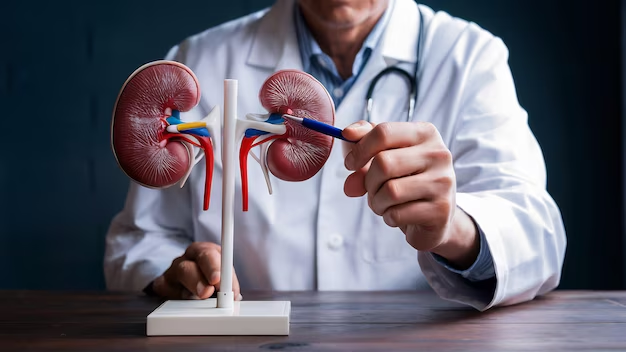At Askdoctor.ai, we understand that managing Chronic Kidney Disease (CKD) can be overwhelming, especially when it’s often undetected in its early stages. With over 37 million adults in the U.S. living with CKD, many are unaware of the subtle signs or risk factors that can lead to serious complications. That’s why we’ve created this content to help you recognize the early symptoms, understand the causes, and provide evidence-based strategies for prevention and management. Our goal is to empower you with the knowledge and tools you need to take control of your kidney health, make informed decisions, and improve your quality of life.
Chronic Kidney Disease (CKD) affects an estimated 850 million people worldwide, making it a global health concern. In the United States alone, around 37 million adults are living with CKD, and many may not even be aware of it until it progresses to more advanced stages. According to the National Kidney Foundation, early detection and proactive management are crucial, as they can slow the disease’s progression and help individuals live healthier lives.
CKD is a condition where the kidneys gradually lose their ability to function properly, impacting many aspects of daily life. The disease develops slowly and often without clear symptoms, which is why understanding the early warning signs, causes, and prevention strategies is critical. In this article, we’ll explore the symptoms of CKD, treatment options, lifestyle changes, and practical steps you can take to reduce your risk.
Symptoms & Causes of Chronic Kidney Disease
CKD typically develops slowly and may not show clear signs in its early stages. Understanding the subtle symptoms and recognizing risk factors can help with early diagnosis.
Early Symptoms of CKD
As kidney function declines, several symptoms may emerge. These symptoms often develop gradually, and many people do not notice them until the kidneys have sustained significant damage. Some of the key symptoms of CKD include:
- Fatigue and Weakness: One of the most common symptoms of CKD is tiredness, often due to the buildup of waste products in the blood. The kidneys’ ability to filter toxins is impaired, leaving the body feeling fatigued and sluggish.
- Swelling (Edema): Swelling in the legs, ankles, and feet can occur due to the kidneys’ inability to remove excess fluid from the body. In severe cases, it can also affect the hands or face.
- Swelling can be a sign of fluid retention caused by impaired kidney function.
- Changes in Urination: Individuals with CKD may notice changes in how often they urinate. For example:
- Increased frequency of urination, especially at night (nocturia).
- Foamy urine or urine that appears darker than usual.
- Pain or difficulty urinating may also occur.
- Shortness of Breath: Difficulty breathing can result from fluid buildup in the lungs (pulmonary edema), which happens as the kidneys fail to process fluids effectively.
- Nausea and Vomiting: As waste builds up in the bloodstream (uremia), it can cause nausea, vomiting, and loss of appetite, making it hard for the body to digest food properly.
- Back Pain: Pain in the lower back can occur, typically in the area where the kidneys are located. This may be due to kidney inflammation or infection.
Causes of Chronic Kidney Disease
The development of CKD is often linked to other chronic conditions that place significant strain on the kidneys. Below are the primary causes of CKD:
- Diabetes: High blood sugar levels damage the blood vessels in the kidneys over time. According to the CDC, 1 in 3 adults with diabetes will develop kidney disease. Diabetes is the leading cause of CKD in the U.S.
- High Blood Pressure: Hypertension puts pressure on the blood vessels in the kidneys, damaging them and impairing their ability to filter waste effectively. This is the second most common cause of CKD.
- Glomerulonephritis: This is an inflammation of the glomeruli, the kidneys’ filtering units. It can cause damage to the kidneys, leading to impaired function.
- Polycystic Kidney Disease (PKD): PKD is a genetic disorder where fluid-filled cysts grow in the kidneys, eventually leading to kidney failure.
- Age: The risk of developing CKD increases with age. Around 36% of adults aged 65 or older are affected by CKD, with a higher prevalence in elderly individuals.
- Family History: If CKD runs in your family, you are more likely to develop the condition yourself.
- Other Contributing Factors: Smoking, obesity, and certain medications (e.g., pain relievers) can also contribute to the development of CKD.
Treatment Options for Chronic Kidney Disease
While CKD cannot be completely reversed, it can be managed effectively with proper treatment. Early intervention plays a key role in slowing the progression of the disease and minimizing complications.
Conventional Treatment for CKD
- Medications:
- Angiotensin-Converting Enzyme (ACE) Inhibitors and Angiotensin Receptor Blockers (ARBs): These medications help control blood pressure and protect the kidneys from further damage.
- Diuretics: Also known as water pills, diuretics help reduce swelling and lower blood pressure by helping the kidneys remove excess fluid.
- Erythropoiesis-Stimulating Agents (ESAs): These are used to treat anemia, a common complication of CKD, by stimulating the bone marrow to produce red blood cells.
- Statins: Statins help manage cholesterol levels, which can worsen kidney disease if left untreated.
- Dialysis:
In advanced stages of CKD, dialysis may be necessary to help the kidneys remove waste, toxins, and excess fluids from the body. There are two types of dialysis:- Hemodialysis: Involves filtering the blood through a machine outside the body.
- Peritoneal Dialysis: Involves using the lining of the abdomen to filter waste and fluids.
- Kidney Transplant:
When kidney function declines to end-stage renal disease (ESRD), a kidney transplant may be necessary. According to the U.S. Organ Transplant Registry, over 100,000 people are currently waiting for a kidney transplant in the U.S.
Alternative and Complementary Treatments
In addition to conventional treatments, many people explore natural therapies to help manage CKD. While these should always be discussed with a healthcare provider, some potential natural treatments include:
- Herbal Remedies: Certain herbs, such as dandelion root and nettle leaf, may help support kidney health by promoting detoxification and reducing inflammation. Always consult a healthcare provider before incorporating herbal remedies into your routine.
- Acupuncture: Some studies suggest that acupuncture may help improve kidney function and reduce symptoms like pain, fatigue, and swelling in CKD patients.
- Proper Hydration: Staying hydrated is important, but individuals with advanced CKD may need to monitor fluid intake to avoid complications like fluid overload. So, always consult a doctor to determine the right balance.
Lifestyle Adjustments & Management Tips
Making positive changes to your lifestyle can significantly improve your kidney function and slow the progression of CKD.
1. Diet & Nutrition
A kidney-friendly diet is essential for managing CKD. The National Kidney Foundation offers dietary guidelines to help individuals with CKD. Some dietary recommendations include:
- Limit Sodium: Reducing sodium intake is crucial for controlling blood pressure and preventing fluid buildup. The recommended daily limit for sodium is 2,300 mg for the general population, but CKD patients may need to restrict it even further.
- Control Protein Intake: High protein intake can worsen kidney function, as the kidneys must work harder to eliminate waste products from protein metabolism. A dietitian can recommend an appropriate amount of protein based on the stage of CKD.
- Incorporate More Plant-Based Foods: Diets rich in fruits, vegetables, and whole grains are easier on the kidneys and provide essential nutrients while avoiding excess protein or unhealthy fats.
- Limit Potassium and Phosphorus: High levels of potassium and phosphorus can cause complications in CKD. Foods like bananas, tomatoes, dairy products, and nuts should be eaten in moderation.
- Avoid Processed Foods: Highly processed foods tend to be high in sodium, unhealthy fats, and preservatives, which can worsen kidney disease.
2. Exercise and Physical Activity
Regular physical activity is essential for CKD patients. It helps lower blood pressure, improve cardiovascular health, and manage blood sugar levels. The American Heart Association recommends at least 150 minutes of moderate exercise per week, such as walking, cycling, or swimming.
3. Stress Management
Stress can contribute to high blood pressure, which in turn can worsen CKD. Practices such as yoga, meditation, and deep breathing can help manage stress and improve overall well-being.
4. Regular Medical Checkups
CKD requires ongoing monitoring to track kidney function and manage complications. Regular blood and urine tests, along with blood pressure checks, are essential for keeping CKD under control.
Living with CKD: Stories of Strength and Recovery
Personal stories can offer hope, encouragement, and a reminder that chronic kidney disease (CKD) is manageable with the right support and choices. Here are two inspiring real-life examples of individuals who successfully faced CKD and made remarkable recoveries:
Mary’s Journey: From CKD Diagnosis to a New Life After Transplant
Mary’s story is a powerful example of how resilience and medical intervention can restore health and hope. After being diagnosed with chronic kidney disease, Mary experienced a gradual decline in kidney function, leading to the need for dialysis. Despite the physical and emotional challenges, she remained committed to her treatment plan. Eventually, Mary received a life-saving kidney transplant that transformed her quality of life.
Her journey highlights the importance of early diagnosis, adherence to medical advice, and the life-changing impact of organ donation. Today, she shares her story to help others facing similar challenges.
Watch Mary’s story on YouTube: Mary’s Story – A Journey from Chronic Kidney Disease to Transplant
B.T. Washington’s Triumph: A Veteran’s Battle Against CKD
Retired U.S. Air Force veteran B.T. Washington spent over 30 years in military service before receiving a diagnosis of chronic kidney disease. He speaks candidly about the shock of the diagnosis and how it impacted his life. With discipline, routine monitoring, and a strong support system, B.T. took control of his health by following a strict kidney-friendly diet, staying active, and staying on top of his treatments.
B.T. not only stabilized his condition but also became an advocate for early screening, especially among veterans and people at high risk. His story is a testament to the power of perseverance and lifestyle change.
Watch B.T.’s inspiring journey: Chronic Kidney Disease (CKD): B.T.’s Story
These stories remind us that while CKD can be a serious diagnosis, it is not the end of the road. With early detection, informed choices, and support, many individuals can continue to lead fulfilling lives.
FAQs About Chronic Kidney Disease
- Can CKD be cured?
Currently, CKD cannot be cured, but its progression can be slowed with proper treatment and lifestyle adjustments. Early diagnosis is key to managing the condition effectively. - What is the best diet for CKD?
A kidney-friendly diet includes reducing sodium, controlling protein intake, and limiting foods high in potassium and phosphorus. It’s also important to avoid processed foods. - How can I prevent CKD?
Managing risk factors such as diabetes, high blood pressure, and obesity is critical for preventing CKD. Regular checkups and healthy lifestyle choices are essential for reducing your risk. - How long can someone live with CKD?
With proper management, many people with CKD live long, healthy lives. The key is early diagnosis, proper treatment, and lifestyle changes.
Conclusion: Take Control of Your Kidney Health Early
Chronic Kidney Disease may feel overwhelming, but with early detection, ongoing management, and positive lifestyle changes, it’s possible to maintain a good quality of life. By understanding the early signs, managing risk factors, and adhering to a kidney-friendly diet, you can significantly slow the progression of the disease and avoid complications.
Remember, CKD is a condition that requires attention, but it doesn’t define you. With the right treatment and mindset, you can continue to live an active, fulfilling life. Regular checkups and staying informed are essential tools in managing CKD effectively.
If you’re concerned about your kidney health or believe you might be at risk, don’t hesitate to consult with your healthcare provider. Early intervention can make all the difference in preserving kidney function and improving overall well-being.
If you have experience managing CKD, share your story in the comments below. Your journey could inspire others who are facing similar challenges. Together, we can support each other in the fight for better kidney health.
References:
National Kidney Foundation
Centers for Disease Control and Prevention (CDC)
U.S. Organ Procurement and Transplantation Network (OPTN)
American Heart Association
Royal Society of Medicine
Mayo Clinic









Leave a Reply